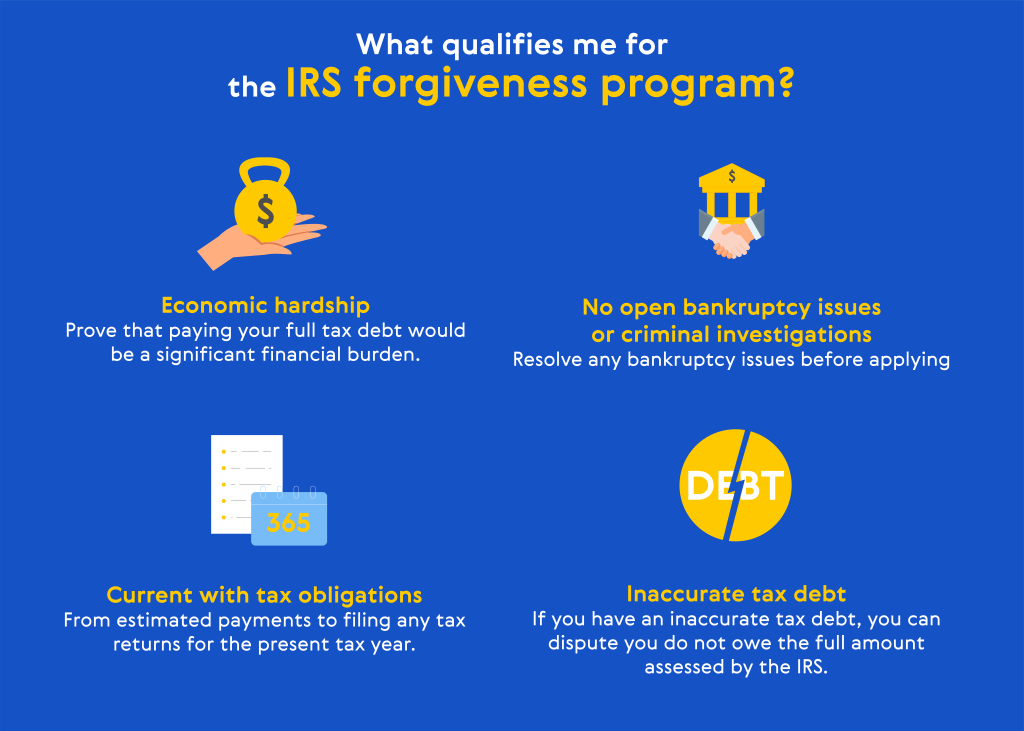IRS Forgiveness Program
Our Services
Does the IRS have a debt forgiveness program?
The IRS offers tax debt forgiveness programs to those who are experiencing financial hardships and owe money to the IRS. If you owe back taxes to the government, you are not alone. Millions of Americans each year find themselves with weighty tax debt – facing IRS penalties such as garnished wages, tax liens on property, and levied bank accounts.
If you owe money to the IRS, and you can’t pay it right away, there may be a solution for you:
- There are several IRS debt forgiveness programs available to help take the load off your back.
- Some may even eliminate your tax debt entirely.
- Recent IRS initiatives provide penalty relief for taxpayers with assessed taxes less than $100,000 for tax years 2020 and 2021.
Read on to learn more about IRS debt forgiveness programs, the IRS fresh start forgiveness program, if you are qualified, and how to apply for 100% debt forgiveness today!
What is the IRS Debt Forgiveness Program?
The IRS debt forgiveness program is an option for resolving any tax debts owed to the government. If you can’t afford to pay off your full tax liability, this program may help you:
- Repay debts swiftly and effectively.
- Find relief from burdensome penalties.
- Eliminate interest charges completely.
- Restore credit scores over the long term.
The IRS usually requires an up-front payment from those trying to pay off tax debt or back taxes. This lump sum is often too much to pay all at once, and those who can’t afford to pay their tax liabilities may expose themselves to penalties and fines.
If there is a reasonable reason for not being able to pay your tax debt, you may be able to avoid these types of hefty consequences. IRS forgiveness programs, such as the Offer in Compromise, offer a way to settle your tax debt for less than the full amount owed by meeting specific eligibility criteria and providing financial hardship documentation.
Other programs can help you consolidate all of your debts into monthly payments through a payment plan, help you negotiate a debt settlement, or enable tax forgiveness credits against your earned income to reduce your tax debt amount annually.

What types of tax debt forgiveness programs are there?
There are a number of tax debt relief programs offered by the IRS to taxpayers in financial hardship. Each program is different and will have different requirements, qualifications, and benefits. The main types of tax debt relief offered by the IRS are a part of the IRS Fresh Start program and also include the following:
Installment Agreement Payment Plan:
An Installment Agreement lets you pay your tax debt in monthly installments if you can’t afford the total amount upfront. This is a great option for those looking to avoid additional fees and penalties. The typical repayment period is 72 months and may be available if you owe more than $50,000 in combined debt, interest, and penalties.
Think a payment plan may be the best option for you? Read more about it here.
Offer In Compromise:
The Offer in Compromise (OIC) is a settlement option that reduces your overall tax debt if you can prove that you can’t pay it off. Demonstrating limited asset equity is crucial in proving financial hardship for the Offer in Compromise.
Accepted Offer in Compromise applications require a non-refundable deposit payment depending on the size of your tax debt and the way you decide to pay such as:
- Lump sum cash
- Short-term payment plan
- Deferred payment plan
Our team of qualified tax attorneys, CPAs, and ex-IRS agents have helped our clients save thousands from IRS collections through the Offer in Compromise. For a successful application, call us today!
Currently Not Collectible Status:
Currently Not Collectible Status is a relief program that can delay IRS collection and prevent the seizing of any assets or property.
You will need to demonstrate that paying the full amount of your tax debt would create a financial hardship, and if approved, you will need to pay a non-refundable deposit – typically 20% of your offer amount. Delaying IRS collections and preventing bank levies can make monthly expenses much more manageable.
IRS Penalty Abatement:
The IRS Penalty Abatement is a penalty waiver. The most common penalties that can be waived under this forgiveness plan are:
- Penalties for not paying taxes on time.
- Penalties for failure to file a return on time.
- Penalties for businesses that don’t pay employment taxes on time or pay them incorrectly.
- Penalties for late filing for partnerships and S corporations.
- Estimated tax penalties
It is important to stay informed about penalty abatement initiatives for specific tax years, such as 2020 and 2021, to understand your options for relief.
When you want to claim a refund and request penalty abatement, you will have to fill in Form 843. While you can try to work with the IRS yourself, it’s often best to find help from qualified tax professionals to obtain as much relief as possible.
What types of tax debt forgiveness programs are there?
Although the IRS has resumed collection notices for individuals with tax debts before tax year 2022, the IRS offers penalty relief for taxpayers with assessed taxes less than $100,000 for tax years 2020 and 2021.
Remember, each program has different benefits and qualifications for those looking to lower their tax debt. Consulting with tax experts can help you understand your eligibility and the specific requirements for each program. Some qualifications and ways to qualify for an IRS debt forgiveness program are:
Economic hardship:
One of the more important qualifications is that taxpayers must prove that paying their full tax debt would be a significant financial burden. In your application, you will need to prove this by providing detailed financial information to the IRS.
Current with tax obligations:
Applicants must be up to date with their tax obligations for the present tax year, from estimated payments to filing any tax returns required for the current year.
No open bankruptcy proceedings or criminal investigations:
Taxpayers currently going through bankruptcy proceedings or under investigation in a criminal tax case are generally not eligible for a forgiveness program. Typically, bankruptcy issues must be resolved before applying.
Inaccurate tax debt:
If taxpayers believe they have an inaccurate tax debt, they can dispute that they do not owe the full amount of taxes assessed by the IRS.

For more detailed insights into the IRS collection process and IRS debt forgiveness procedures, you can visit the IRS website and access resources like Publication 594. To learn exactly what you will need to qualify and make a successful application, call us today.
Can I negotiate with the IRS myself?
Taxpayers can apply for IRS programs directly, but navigating these options can be challenging and time-consuming, especially if you are not familiar with tax law and IRS procedures. Missteps in the application process or misunderstanding of eligibility requirements can lead to delays, rejections, or less-than-favorable terms.
This is where IdealTax comes in. Our team of federally licensed tax professionals, including enrolled agents, tax attorneys, accountants, and tax experts, specializes in IRS negotiations and tax debt relief. With years of experience and a deep understanding of IRS procedures, we can streamline the process and increase your chances of a favorable outcome.
Why Choose IdealTax?
- Expertise and Experience: Our professionals have a proven track record of successfully negotiating with the IRS. We understand the nuances of tax law and know how to present your case effectively.
- Personalized Approach: We tailor our strategies to your unique situation, ensuring that you get the best possible solution for your tax debt.
- Stress-Free Process: Let us handle the paperwork, negotiations, and follow-ups with the IRS, so you can focus on what matters most to you.
- Higher Success Rate: With our knowledge and experience, we can avoid common pitfalls and increase the likelihood of your application being accepted.
While you can negotiate with the IRS on your own, partnering with IdealTax provides you with the expertise and support needed to navigate the complex world of tax debt relief efficiently and effectively.
Contact us for a free consultation to explore your options and start your journey towards financial relief.
Is the IRS forgiveness program legit?
Yes, the IRS debt forgiveness program is legitimate and offers real solutions for those struggling with tax debt. Here are some real-life success stories from our clients who have benefited from the program:
- Fusco faced a $20,000 debt to the IRS. Our experts helped her achieve Currently Non-Collectible Status, providing immediate relief from her debt obligations.
- Sysol owed the IRS $88,533. With our assistance and through the compromise program option within the IRS debt forgiveness program, we successfully negotiated her debt down to just $100.
- Heron was burdened with a $48,259 IRS debt. After consulting with our experts, he qualified for Currently Non-Collectible Status through the IRS Forgiveness Program, ensuring that the IRS would no longer attempt to collect from him unless his financial situation improved.
To all taxpayers struggling to pay their debts, the IRS Forgiveness Program is meant for you! Our experts at IdealTax are ready to take your case and work on it day and night until your financial problems disappear. Contact us or give us a call today!


